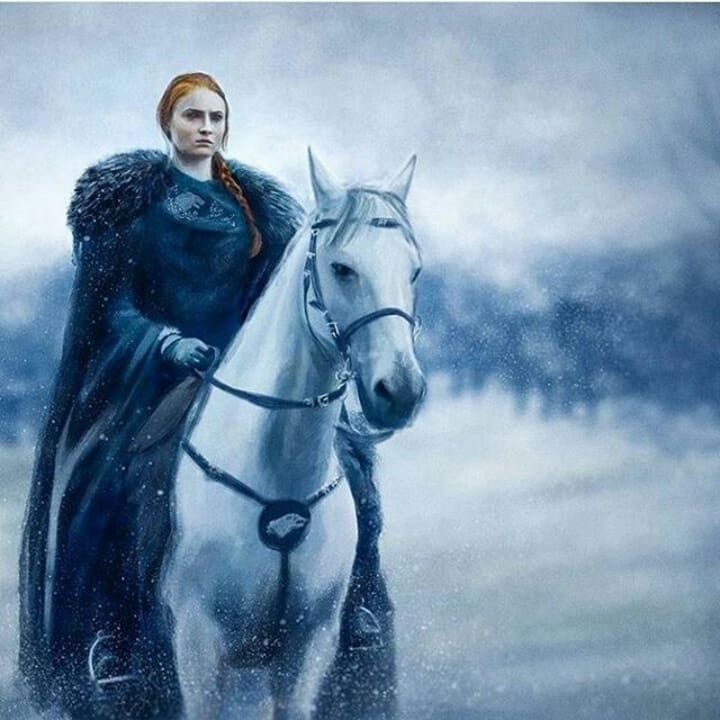Top Five Friday
Top Five "Miss Understoods" In Historical Movies and TV

It's tough being a woman. No matter how hard you try, someone will always criticize what you do. Not feminine: you're mannish, unattractive, and too aggressive. Feminine: you're silly, frivolous, and kowtowing to the patriarchy. Sexual: you're slutty and dangerous. Not sexual: you're an uptight prude. Outspoken: you're a bitch who needs to shut up. Demure and retiring: you're a doormat who needs to stick up for herself. Being too much of one thing is liable to make you disliked. The same applies to women in fiction.
As a writer, I know that female characters in literature, film, and television are under more scrutiny than their male counterparts. Quite rightly, there is a demand for women to be depicted just as dynamically as men in the media but all too often an unsuspecting heroine fails to live up our high expectations.
Here are five ladies that I feel have gotten a bad rap.
5: Maria Reynolds from Hamilton

Scarlet Woman?
It's easy to hate Maria Reynolds, especially if you're a huge Eliza Schuyler fan like I am, the sultry young seductress who leads Alexander Hamilton astray and whose husband blackmails and ruins him. Since her portion of the show is told through Hamilton's perspective, the red-clad Maria is portrayed is a literal scarlet woman who takes advantage of his gallantry and betrays him but we are given clues that the story is more complicated than that.
The motives of the real-life Maria Reynolds have long been the subject of speculation by historians. As it plays out in Hamilton, she originally approached Alexander Hamilton saying that she wished to flee her abusive husband and needed his help. Hamilton, being the gentleman he was, obliged and this was the beginning of a year-long affair. Maria's husband James took advantage of the situation and began charging Hamilton for his wife's favors under pain of him spilling the beans to Hamilton's wife, Eliza. Some historians have come to the conclusion that the Hamilton-Reynolds affair was likely a scam instigated by James Reynolds with Maria as either a willing or coerced accomplice.
As much as I hate what she did, I can understand why someone would feel bad for her and why a significant part of the Hamilton fandom vehemently defends her. Her story shows how helpless women in her time were to the demands and whims of men and how they were vilified and condemned for things that men got off scotfree for. The poor girl found herself in some shitty circumstance but shitty circumstance can make us do shitty things.
We want to classify Maria Reynolds as a saint (a poor abused woman who was unlucky in love) or as a sinner (a homewrecking whore) but the truth is that she was neither.

"Please Don't Go Sir"
4: May Welland Archer from Age of Innocence

As pure as a lily...
For starters, I do not like Edith Wharton. I find her stories to be a whole bunch of overly melodramatic boo-hoo about characters I do not like or care about.
Depending on who you ask, May from Age of Innocence is either a vapid and insipid ninny or a manipulative bitch. She is the cloyingly sweet little lily who binds Newland Archer to high society world that he loathes but I am perhaps the only one who finds themself rooting for her throughout the story. Newland Archer is the man-child king of the first world problems; one of those people who has everything and yet is still unsatisfied. He is not man enough to break things off with May when he has the chance and go after his true love, the pretentious Countess Ellen Olenska, or lie in the bed he made and be content with May and let Madame Olenska be. We get hints that Newland overlooks May's intelligence and depth and that she is not as sweet or oblivious as she seems. She is often compared to the goddess Diana, who associated with purity and virginity but also with hunting, and who is ruthless with those who mess with her. When May informs her cousin, Ellen, of her pregnancy, before she is fully certain, as a sort of "back off bitch," I find myself wanting to high five her.

...but as ruthless as Diana
3: Cosette from Les Miserables

"Why does everyone hate me?"
Cosette's main crime is being overshadowed by a more interesting and relatable character: Eponine. Unrequited love is something many people can understand and it is easy to hate and resent our romantic rivals. No matter how much we say that they "unfairly" stole our crush's affection, it does not change the fact the love is rarely fair. People will always love those who are unworthy of them and spurn those who are worthy.
Cosette might not be the meatiest character in Les Miserables but once we get past the fact that Marius loves her and not unfortunate every girl Eponine, we find that Cosette is not such a bad person. She is sweet, charitable, loving, loyal to her adoptive father Jean Valjean, and charms everyone who meets her, including Marius's curmudgeonly grandfather who declares that if he were a younger man, he would fight a duel with Marius over her. When told the truth that Jean Valjean is not her real father, Cosette tells him that her love for him is unchanged, which is one of the most touching scenes in the book.
One of the hardest things to accept is that the person who got the thing you wanted (whether it be a job or a lover) might be worthy of that thing after all.

Cosette was not very timid by nature. There flowed in her veins some of the blood of the bohemian and the adventuress who runs barefoot. It will be remembered that she was more of a lark than a dove. There was a foundation of wildness and bravery in her.
2: Sansa Stark from Game of Thrones

Littlefinger: "Life is not a song, sweetling. You may learn that one day, to your sorrow."
If there's a bigger victim of internalized misogyny than Game of Thrones' Sansa Stark, I have yet to find her. She has done some pretty stupid and dubious things but compared to many other Game of Thrones characters, her rap sheet is pretty tame. So why do so many GOT fans loathe her?
The answer is the aforementioned internalized misogyny. Because Sansa fits the feminine ideals of her time and place, we are subconsciously told to view her as weak and frivolous and unrelatable. Because she deals with the abuse she suffers at the hands of Joffrey and Ramsey with stoic dignity, we are told to get frustrated with her for not sticking up for herself. Because she is a survivor and diplomat and not a warrior, she gets overshadowed by more "badass" characters.
But, to quote Taylor Swift's song "Look What You Made Me Do," Sansa "got smarter, got harder." In current seasons, Sansa has shed her naivety and romantic ideals to become a canny politician and indispensable advisor to Jon Snow. Her detractors have reacted to the newly empowered and assertive Sansa by saying that she is meddlesome and doesn't know her place. A girl can never win, can she?

Throw her to the wolves and she'll come back leading the pack.
1: Lady Edith Crawley from Downton Abbey

F**k off Mary.
Starting off, there was little that was attractive or redeemable in the middle daughter of Downton Abbey's Crawley clan: Edith, a bitter and petulant wall flower constantly at odds with her more glamorous and confident older sister Mary and almost ruins Mary's life by leaking the scandal of Mary's affair with a Turkish diplomat. But Edith's behavior can easily be explained by Mary's constant bullying. As the years passed and Edith grows into her self and finds her niche in the world, she became a stronger and more likable person.
Like with Game of Thrones' Sansa Stark, a portion of the fanbase refuses to acknowledge that Edith has gone through and dismiss her as whiney, as if whiney is worse than being an entitled, mean-spirited, snob like Mary. Her detractors continued to use her mistakes to justify their dislike of her and refused to admit that Edith came a long way from jealous old maid in waiting, to a modern single mom and magazine editor, to marrying a smitten Marquis and outranking the rest of her family. Whereas Mary returns to her bitchy old ways after the death of her beloved Matthew and arguably becomes worse, constantly sniping at Edith without provocation and toying with then abandoning her suitors, Edith becomes a better person.

Taking care of business
About the Creator
Rachel Lesch
New England Native; lover of traveling, history, fashion, and culture. Student at Salem State University and an aspiring historical fiction writer.






Comments
There are no comments for this story
Be the first to respond and start the conversation.